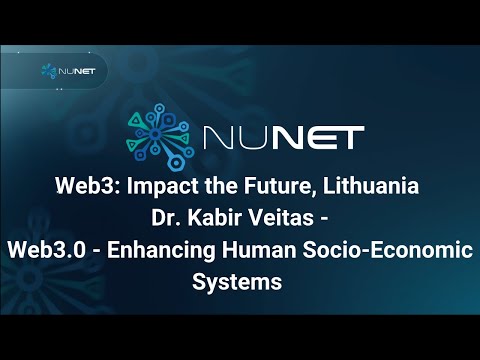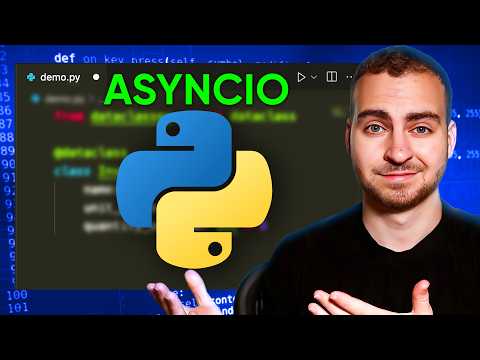Web3: Impact the Future, Lithuania - Kabir Veitas, Web3.0 - Enhancing Human Socio-Economic Systems

yes web free is a social technological movement so please prepare your questions for our next keynote speaker Kabir Vedas who will tell us more about the impact that web3 can or might have on socioeconomic structures on the global level now Kabir is a co-founder and CEO of a deep Tech startup newnet building a global economy of the centralized Computing that leverages data of the art compute Technologies and web free Technologies Kabir the stage is yours thank you good afternoon and what would you know as everybody who managed to get here physically I will say good to be back in the news every time I come it's it becomes more more and more beautiful uh however I have a small problem uh that is first of all the timer is not working second is that I was thinking to con sort of start convincing you the web free is not only about the crypto crypto is not only about the fintech and then the top three is different from the 3.0 however many of these things were already touched kind of introduce used by the speakers before the before launch so therefore I will try to fix certain things in in sort of frame things into into how do I see or I would like to you to see uh the 3.0 from the perspective of societological development of the of the basically Humanity as a social system and picks it on things that were already introduced previously and and kind of put them into this perspective so and the image that I would like to to kind of project first of all is the image that was introduced by Buckner's follow Fuller I think pretty much of a centurable of the spaceshipers so we are basically traveling a spaceshipers and we started as a bunch of monkeys without understanding how that works and simply riding along and we seem to be in a place where we started to punch all kind of different controls and started to influence how the spaceshipers at least not a trajectory but basically internal temperatures and there's a the kind of question that actually statement that book Mr Fuller brought along is that we don't really have a user manual for that spaceshipers so and we need to get this user manuals that sort of controlling it and then uh in an intelligent manner and the in terms of this image the question that I would like to ask and try to sort of discuss it is I mean the global the global question would be then can we become more intelligent as a system in this sense as a social technological system and the question that is related to the free or the 3.0 is is whether this technology can make us more intelligent a I can say my answer I think it does or it can depending how we use it however there are different aspects to it so the question is how do we make our our system technological system more intelligent as a as a whole and I think so another another aspect that I would like to discuss is I think that if we continue to kind of steer on to to sort of punish the controls of the spaceship earth without without let's say without reading the manual or without understanding the manual or in a way that we were doing this all along it's it's a question of whether anything will help will happen differently except that it will be faster and that's it so it was a was a it can something can change qualitatively rather than quantitatively without changing our thinking or perspectives yes and also uh we hear about all these beautiful Technologies basically and the three if we related to the blockchain is basically we can say that the basis of the movement is a beautiful technology but these Technologies can be used for pretty much two things well probably more but let's say let's say two is for solving Generations that exist and kind of expanding towards opportunities that that we can project most of the time we are talking well at least what I've heard today about the opportunities that they bring however we also can use them for solving certain challenges that just exist so in this talk I would like to position the web I will call it web 3.0 just to
kind of uh remind that it's different from the free and that is not only fintech and and crypto in a broader context between intersections of interdisciplinary Fields including distributed I.T systems decentralized governance artificial intelligence social Systems Technology policy and the role of technology in human development as a whole and asking this question what is the potential of the 3.0 movement when consider the evolution of human society and human species in principle in this century and beyond my name is Kabir betas and I have spent the last decade studying intelligence in the interdisciplinary manner or at least before a couple of years ago and currently I'm helping my team to run a deep talk startup monit which is where we use the 3.0
Technologies as a part of it for developing a decentralized Computing platform and economy and Paving away for the cooperation between machines and humans uh for the for the digital age which hopefully well has come so before co-founded Monet I have spent a few years as the AI research in Singularity net which is building a Global AI Marketplace for AIS to interact with each other and before that basically I came directly from Academia from the global brain Institute in Free University of Brussels we're actually all three co-founders of Monet have met in 2014 so the global brain is a vision of a planet is scale information and communication technology Network that include exactly what we're doing interconnects all humans and the technological artifacts into one socio-techological system So eventually this Vision basically projects that this coordination will become increasingly intelligent intelligent on its own uh eventually taking over coordination [Music] and communication from traditional organizations and Nations States possibly which are traditional organizations and we'll start playing a kind of role of a brain of planeters which hopefully will make us more intelligent for so flying the spaceshipers and most importantly for me this this Global brain uh research initiative let's say let's call it this way is an interdisciplinary research program which relates cognitive science distributed systems complexities and science computer science AI philosophy of mind and many more so I have also done research of AI policy and applying AI in a social group like how AI will integrate into the social fabric of our society as well as basically technology policy design foreign 3.0 I believe that this web free movement in this broader sense and the technology that it can bring or it brings a can be I mean will help our sociological system or our society Humanity to become model intelligent adaptive and responsive to the challenges of the of the ship spaceship earth uh and to solve a challenge that is currently facing why is that the main the main statement or yeah reason for for me thinking so is that I believe that intelligence is inherently and necessarily decentralized so basically you do not have such a thing as non-decentralized intelligence and these Technologies are the 3.0 bring well rather we develop within the movement of 3.0 uh bring this decentralization into our computational economic political and natural universes or rather they bring us they give us the opportunity to decentralize and to become to make the sociotechnological system more intelligent they usually used term is actually distributed intelligence rather than decentralized intelligence and we can think of let's say natural systems like brain which are made of neurons and neurons are pretty stupid well let's say simple systems and the thing that makes our brain supposedly well intelligent is just that there are many neurons and they interact between each other and we actually do not really know how does that happen but we know that this is pretty much what happens is that a lot of simple systems interacting between each other in adaptive and fluid way brings about intelligence another textbook example is Angel where again an aunt is quite a simple organism however when you put a lot of fans into one uh anhill and they interact between each other they become very intelligent and what you need for that you need communication medium so electric signals in terms in in in case of brain and in case of neurons and pheromones in case of ants so I consider that 3.0 not only technology movement first of all not only technology but also movement in order to change the society and how do we deal with well how do we still spacious person uh so undoubtedly it started with a beautiful technology of blockchain but at least the movement started I don't believe that the the overall space started with that technology of a blockchain inspired us to to get into to movement which I believe may change the way we interact with a spaceshipers and with ourselves and with the technology now I will skip the the sort of convincing moment that the free is not 3.0
however looking from somewhat different different corner of debate and relating to the presentation of doctor I'll follow Tosca a social technological development of human society so La shrap executive chairman of the world economic Forum has coined the term forced Industrial Revolution which I think was not mentioned and that is characterizes Fusion of physical digital and biological worlds into a single complex socio-technological system where each part of the system has a high degree of autonomy to decide how to behave meaning that technological artifacts in this system we'll have a degree of autonomy or intelligence to behave and to choose the way they behave in the system and this is impacting all disciplines economies and industries and importantly to how we are able to integrate all those human constructed systems into our natural systems for attempting to deal with uh yeah with the challenges of space reports and then stabilizing the system if we are able to do that and that relates to the quite a few talks about the metaverse a in a sense that from that perspective we can see metaverse as a space where we can not only play with or interact with each other as humans but also have a yes or let's say technological that effects and by interacting with them become more intelligent intelligent and adaptive and resilient as a global social system and a global organism so I mean sometimes when all right technology is already playing a large part in human intelligence and this trend will just continue to increase now if it sounds a little bit too far-fetched let's say I believe everybody had this this experience when they lost internet connection somewhere in the unknown City and they have to find a place yeah or rushing to the to the to the to the meeting meaning that sort of this effect is called the extended mind mind sees it meaning that our minds and our brains and our intelligence from the point where we started to interact with technology it's not only in our bodies or in our brains but also they are extended to the technological artifacts that are around us or to which we interact so let's say this tablet is my pretty much important piece of my memory without that I may become less intelligent based on that that thesis and this thing can go pretty far if we imagine interaction and communication with uh with all the technological artifacts well let's say through the metaverse we basically do not exactly know maybe we do not care whether any any human entity is behind the avatar and I would argue that it's not important to to establish that identity because if these avatars are intelligent enough for us to engage into this thing communication and to enrich ourselves why would we care that there are humans behind that and certain examples of let's say certain [Music] kind of new new examples of these models language models proof or at least demonstrate cases where you have a conversations with those language models that kind of gone beyond the average conversation with humans and why why not so it's probably clear by now that I'm talking not only about individual intelligence but the whole social technological system as an intelligent uh complex system or intelligence yeah global system so and which is decentralized intelligence or in in this perspective of global brain it's a global brain so once again if it sounds a little bit too far-fetched talking about interacting with AIS and AIS or technological artifacts playing a role in our social technological system we can think about well actually AI sorry GIS as I call AGI is a artificial general intelligence they already exist in our society for a few hundred years probably and these are legal persons or corporations so we we can pretty much imagine that corporations the distributed intelligences or let's say intelligence is surroundings distributed wetware which are our brains and the algorithms that they sort of run are corporate laws legal systems and things like this now but what are the values of those systems and the values of those systems is exactly what's written in the commercial law make profit use that profit for making more profit and accumulate Capital use that capital for more Capital externalize all the costs because you want to do more profit and so given into already taken into account these systems well technological artifacts on that is kind of a technological artifact influence the intelligence of the whole system we can ask the question how does that make us more intelligent as a global global brain [Music] now from again another coming to challenges why we why I consider this topic is of High importance is that as I mentioned the global risk report of this year of world economic Forum which was already was cited quite a few times emphasizes a number of challenges that this well which awaits this work which this world is awaiting well not really waiting but they're coming anyway and that will probably happen in the next decade or further which includes as we know the slowly transition to to zero carbon emissions by 2050 at least this is what they say uh effectively revealing that in principle our planetary support systems and infrastructure has to prepare to for mitigation of those effects rather than imagine that we can get away uh so which will with high probability over here model systems and we basically have to think or to see how to if not rebuild them but adapt them so that they can cope with all these challenges so this opens another layer of 3.0 movement which is governance and kind of political layer which uh I'm very glad that these things were were already touched in the previous discussions and this is what I'm said that I have simple small problems that I saw that I would have to convince anybody about that and what again why why do I see web 3.0 Technologies important this sense and how do we how can we use these Technologies in order to make the system uh more intelligent because I think that these Technologies allows to express and coordinate between different values within the shares of the technological system which is where we all live and interact and on the level which is really completely like completely next level and different from what is possible now or with without these Technologies so we always well we often hear the tokenization the word tokenization that the pre Technologies of a 3.0 Technologies allow us to tokenize any asset which is true however I believe that's not the whole story as a kind of story that is more into perspective of how do we make the global system more intelligent is that the free Technologies if we use them that way they allow for different values to interact between each other which means we can build more Rich inclusive value systems and we can make those value values within value systems to interact between each other and to come up with let's say optimal ways to steer space trippers or at least better ways to see a spaceshipers and what we consider valuable as many dimensions so and financial value is basically only one kind of value of a value expression and arguably for for a good reason which worked for us quite some time however every Dimension is a it is subjective which means well as we know different people can have different values it this can be orthogonal meaning that for some people posit positive value for some people may mean nothing for other people that would be simply indifferent or they can be opposite some people may positively value things that other people will negatively value things and while this is a kind of topic of model Theory but but the bottom line that I would like to stress is much of the social governance the way we are doing that is well basically in general is related to kind of technical constraints of aligning these contradictive values and deciding on one course of action because we all have to steer spaceship earth or two kind of control the climate uh and my statement would be that this Val these constraints technical constraints of aligning these values that I use now in our governance systems can be very much relaxed and made more inclusive rich and diverse with using the 3.0 Technologies so given massive interconnectivity and interdependencies our planetary support systems natural social economic and technological a app basically what's called complex systems as opposed to control systems yeah which we are used to or which were used to build and one of the properties of complex system is that they are chaotic and chaotic systems they basically they defined by this property that a small perturbation in in one part of the system can cause huge perturbation in another part of the system or basically destroy the whole system which is in late arms called Butterfly Effect so and in case of the planetary support systems this kind of perturbations means human suffering and the systemic effect of all those those disturbances that that I was mentioning is that indeed our our social technological system becomes more and more uh well it always was like this but it was kind of managed to stabilize itself but basically it becomes more and more chaotic which means unpredictable in our a let's call them traditional ways of thinking of our governance and Technology systems as Control Systems where we can predict design build and know what will be the results of these things however our well control control system thinking is basically the the main Paradigm based on which we are building our governance systems so but there is another way to to to deal with the station let's go this way from the systemic perspective is that while complex systems cannot be governed as the control systems cannot be fully understood however they are more they can be and are more adaptive a self-organizing and antifragile so in a sense more intelligent than alive so such adaptiveness of organizational and antipragile nature is again characterized by the degree of decentralization in the system and how different perspectives and modes of operation can interact between each other and by that guiding the system towards yeah Evolution or evolving the system so the suggested let's say if I can say so suggested cure a for our planetary support systems would be to use the frit 0.0 technology which is not the only Europe but one of the options which is related to the to the to the topic of this conference is to use the 3.0 technology to make our source Auto logical system more distributed
not only from the technological side but also from the governance perspective by to some extent relaxing our control system thinking and allowing the system to be enter fragile adaptive responsive and alive and more intelligent so I believe and hope that we as the global social system or uh neurons in the global brain we ought and are capable to take this option of of that the 3.0 technology presents us oh and it's not one technology of course it's a huge ecosystem of technology that is being created while we are using them and that is exactly what makes the system alive and an antipragile if we so it presents an option for us to make us as a global technological system more intelligent and in terms of the of the spaceship earth metaphor web 3.0 may prove to be one of the key Technologies among others allowing us to continue this journey in in in space and time thank you for attention and thanks well um thank you Kabir it was a really interesting scientific very multi-layered deep keynote and if we put it on more simpler terms what is your vision uh how our Humanity will look like in upcoming five years for example and in this context what are the three takeaways we have to take from your speech free yes you can go with two or one whoa usually it's more difficult to get one than three I guess the honest answer would be I don't know which and I can probably say I can hope certain things now there was one one good thought that was expressed I mean that I related in the panel about the matters that actually whatever we project we don't know what will actually happen we can only uh basically project that things will change we can try to make it more interesting uh let's say safe if that can be done but evolution is never safe so any and in this sort of accelerator change any clear and specific predictions so basically we can know that this will not happen that's for sure but this specific thing will not happen but what I think is important is to build an environment for the further evolution all right so that's hopefully what will happen yeah it's a
2023-01-04 21:10


